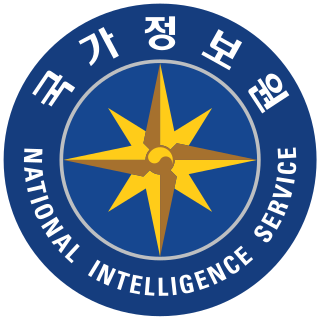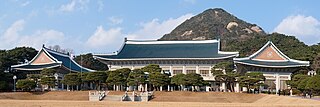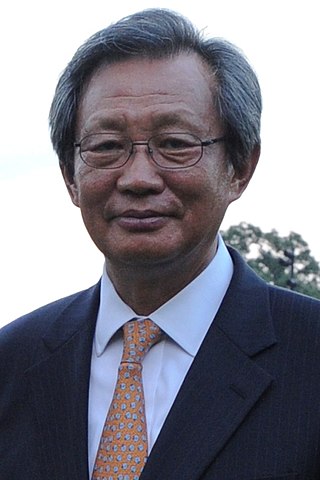Career
Moon has had a number of varied roles. He was an advisor to various agencies of the South Korean government, including the National Security Council, the Ministry of Foreign Affairs and Trade, the Ministry of Defense, the Ministry of Unification, and the National Intelligence Service. He served as Chairman of the Presidential Committee on National Intelligence Reform and a member of the Presidential Commission on Defense Reform during the Roh Moo-hyun administration. Dr. Moon was a special delegate to the first (2000) and second (2007) Korean summits, both of which were held in Pyongyang. He is currently a board member of the Pacific Century Institute, the Asia Research Fund, and the Korea Peace Forum. He was also chairman of the World Economic Forum’s Global Agenda Council on the Future of Korea. [6]
Moon served as adviser to Kim Dae-jung, South Korea’s president from 1998 until 2003, and to Roh Moo-hyun, who held the presidency from 2003 until 2008. [7] During the Roh Moo-hyun administration, he served as Ambassador for International Security Affairs of the Korean Ministry of Foreign Affairs and Trade (MOFAT) and Chairman of the Presidential Committee on Northeast Asian Cooperation Initiative, a cabinet-level post.
Sunshine Policy
Moon was one of the architects of the Sunshine Policy, and advocates, and calls for, the revival of the engagement policy, which seeks the thawing of relations with North Korea and the Government of North Korea. [8] Moon believes that every other option including sanctions and pressures, military actions, containment, and waiting for the regime in Pyongyang to collapse has failed. Moon has blamed US administrations, particularly that of former President George W. Bush, for disrupting the effects of the Sunshine Policy, which had some initial successes before the policy was cancelled in 2008. [2] [9]
In a contribution to Foreign Affairs in April 2018, Moon argues it would be difficult to justify the ongoing presence of U.S. forces in South Korea after the adoption of a North-South peace accord. [10] In a 2018 interview, Moon stated it would be in the best interest of South Korea to abolish the U.S.-South Korea alliance in the long run. [11] At an international conference held by the National Diplomatic Academy's Institute of Foreign Affairs and National Security in April 2019, Moon posed a hypothetical to China “If U.S. Forces Korea withdraws its troops from South Korea without North Korea's denuclearization, what would it be like for China to provide a nuclear umbrella for South Korea and negotiate with North Korea in that state?” [12] In a column written in The Hankyoreh, Moon believes that South Korea should focus more attention on their economic relationship with North Korea than on their alliance with the United States. [13]

North Korea has diplomatic relations with 160 states. The country's foreign relations have been dominated by its conflict with South Korea and its historical ties to the Soviet Union. Both the government of North Korea and the government of South Korea claim to be the sole legitimate government of the whole of Korea. The de facto end of the Korean War left North Korea in a military confrontation with South Korea along the Korean Demilitarized Zone.

South Korea maintains diplomatic relations with 191 countries. The country has also been a member of the United Nations since 1991, when it became a member state at the same time as North Korea. South Korea has also hosted major international events such as the 1988 Summer Olympics and 2002 World Cup Football Tournament and the 2011 IAAF World Championships Daegu South Korea. Furthermore, South Korea had hosted the 2018 Winter Olympics which took place in Pyeongchang, South Korea from 9 to 25 February.
The Sunshine Policy (Korean: 햇볕정책) is the theoretical basis for South Korea's foreign policy towards North Korea. Its official title is The Reconciliation and Cooperation Policy Towards the North (Korean: 대북화해협력정책), and it is also known as The Operational Policy Towards the North (Korean: 대북운영정책) and The Embracing Policy (Korean: 포용정책).

The National Intelligence Service is the chief intelligence agency of South Korea. The agency was officially established in 1961 as the Korean Central Intelligence Agency, during the rule of general Park Chung Hee's military Supreme Council for National Reconstruction, which displaced the Second Republic of Korea. The original duties of the KCIA were to supervise and coordinate both international and domestic intelligence activities and criminal investigations by all government intelligence agencies, including that of the military. The agency's broad powers allowed it to actively intervene in politics. Agents undergo years of training and checks before they are officially inducted and receive their first assignments.

Cheong Wa Dae, also known as the Blue House in English, is a public park that formerly served as the presidential residence and the diplomatic reception halls of South Korea from 1948 to 2022. It is located in the Jongno district of the South Korean capital Seoul.

Diplomatic relations between South Korea and the United States commenced in 1950, when the United States helped establish the modern state of South Korea, officially the Republic of Korea, and fought on its UN-sponsored side in the Korean War (1950–1953). During the subsequent decades, South Korea experienced tremendous economic, political and military growth.

Formerly a single nation that was annexed by Japan in 1910, the Korean Peninsula has been divided into North Korea and South Korea since the end of World War II on 2 September 1945. The two governments were founded in the two regions in 1948, leading to the consolidation of division. The two countries engaged in the Korean War from 1950 to 1953 which ended in an armistice agreement but without a peace treaty. North Korea is a one-party totalitarian state run by the Kim family. South Korea was formerly governed by a succession of military dictatorships, save for a brief one-year democratic period from 1960 to 1961, until thorough democratization in 1987, after which direct elections were held. Both nations claim the entire Korean Peninsula and outlying islands. Both nations joined the United Nations in 1991 and are recognized by most member states. Since the 1970s, both nations have held informal diplomatic dialogues in order to ease military tensions.

Diplomatic relations between the People's Republic of China (PRC) and the Republic of Korea were formally established in August 1992. Before then, the PRC recognized only the Democratic People's Republic of Korea while South Korea in turn recognized only the Republic of China (Taiwan). South Korea was the last Asian country to establish relations with the People's Republic of China. In recent years, China and South Korea have endeavored to boost their strategic and cooperative partnership in numerous sectors, as well as promoting a high level relationship. Trade, tourism and multiculturalism, specifically, have been the most important factors of strengthening two neighbouring countries' cooperative partnership. Despite this, historical, political and cultural disputes have still played several roles on the relations between South Korea and China, especially with China being politically aligned with North Korea.

Mark William Lippert is an American diplomat who worked as the vice president for international affairs at Boeing from 2017 to 2020. In 2022, he was appointed Executive Vice President of Samsung Electronics America. He previously served as the United States Ambassador to South Korea from 2014 to 2017. Prior to his tour as an ambassador, Lippert had served as Chief of Staff for Secretary of Defense Chuck Hagel, Chief of Staff for the National Security Council, and Assistant Secretary of Defense for Asian and Pacific Security Affairs in the Department of Defense. On March 5, 2015, he was attacked by a man wielding a knife in South Korea.

Choi Young-jin is a South Korean career diplomat who served as South Korean Ambassador to the United States from 2012 to 2013, when he was succeeded by Ahn Ho-young.

Kang Kyung-wha is a South Korean diplomat and politician who served as the first female Foreign Minister of South Korea under President Moon Jae-in from 2017 to 2021 as well as the first woman nominated for and appointed to the position. She is also the first Korean woman to hold a high-level position in the United Nations. Previously, Kang was the first non-exam-taker to become a director-general in the ministry. She is the first South Korean foreign minister to join the official South Korean delegation for the inter-Korean summit as well as to visit Pyongyang, the North Korean capital.
Selig Seidenman Harrison was a scholar and journalist, who specialized in South Asia and East Asia. He was the Director of the Asia Program and a senior fellow at the Center for International Policy, and a senior scholar of the Woodrow Wilson International Center for Scholars. He was also a member of the Afghanistan Study Group. He wrote five books on Asian affairs and U.S. relations with Asia. His last book, Korean Endgame: A Strategy for Reunification and U.S. Disengagement, won the 2002 award of the Association of American Publishers for the best Professional/Scholarly Book in Government and Political Science.

Moon Jae-in is a South Korean retired politician who served as the 12th president of South Korea from 2017 to 2022. Prior to his presidency, he served as Senior Secretary for Civil Affairs and Chief of Staff to President Roh Moo-hyun, Member of the National Assembly, and Leader of the Democratic Party of Korea.
Dr. William H. Overholt is a senior research fellow at John F. Kennedy School of Government's Mossavar-Rahmani Center for Business and Government at Harvard University and principal of AsiaStrat LLC, a consulting firm.

Kim Han-jung is a South Korean politician serving as a member of the 20th and 21st National Assembly.

Chung Eui-yong is a South Korean diplomat and a politician who served as Minister of Foreign Affairs from 2021 to 2022. Chung was previously President Moon Jae-in's first Director of National Security from 2017 to 2020.

The 2018 North Korea–United States Singapore Summit, commonly known as the Singapore Summit, was a summit meeting between North Korean Chairman Kim Jong Un and U.S. President Donald Trump, held at the Capella Hotel, Sentosa, Singapore, on June 12, 2018. It was the first-ever meeting between leaders of North Korea and the United States. They signed a joint statement, agreeing to security guarantees for North Korea, new peaceful relations, the denuclearization of the Korean Peninsula, recovery of soldiers' remains, and follow-up negotiations between high-level officials. Both leaders also met separately with Singaporean Prime Minister Lee Hsien Loong.

The Peace Treaty on Korean Peninsula is a proposed settlement to formally end military hostilities on the Korean Peninsula as a follow-up to the 1953 Korean Armistice Agreement implemented by the United Nations after the Korean War. During the inter-Korean summit on April 27, 2018, Kim Jong-un and Moon Jae-in signed the Panmunjom Declaration; the declaration involved an agreement about mutual efforts and action items for transforming the armistice agreement into a peace treaty with the cooperation of the United States and China. During the 2018 Trump–Kim summit, US president Donald Trump and Kim signed a Joint Statement which reaffirmed the Panmunjom Declaration. On November 23, 2023, North Korea terminated its 2018 agreement with South Korea, citing escalating military provocations, and plans to deploy military forces along the military demarcation line.

Kim Joon-hyung is a South Korean professor of international relations at Handong Global University served as the Chancellor of Korea National Diplomatic Academy of Ministry of Foreign Affairs under President Moon Jae-in from 2019 to 2021.

Sung Deuk Hahm is Dean of the Graduate School of Political Studies and Naun Professor of Political Science and Law at Kyonggi University. Concurrently, he is Executive Director (2023-present) of the Incheon Security Conference (ISC). The purpose of ISC is to commemorate the victory of the Incheon Landing Operation, also known as Operation Chromite in September 15, 1950. ISC is funded by the Incheon Metropolitan City and the Korean Institute for Presidential Studies and hosted by Kyonggi University Graduate School of Political Studies. The inaugural ISC was held at Songdo on September 18, 2023 and examined the emerging perception of a new Cold War after the Ukraine War.

















